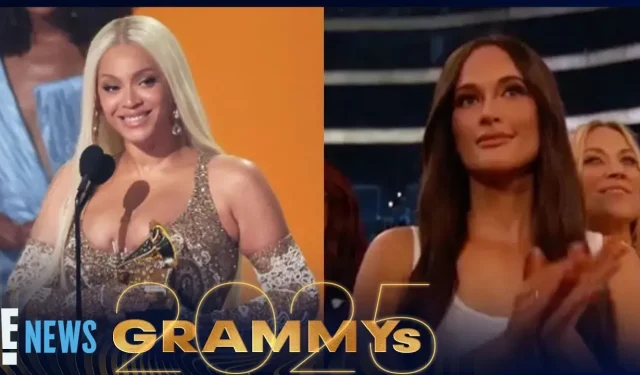In the aftermath of the 2025 Grammy Awards, a discussion arose surrounding Kacey Musgraves’ apparent emotional response to Beyoncé’s victory for Best Country Album with “Cowboy Carter.” This article delves into the events leading up to the viral speculations, Kacey’s clarifications shared through her representative, and the broader implications for both artists in the ever-evolving landscape of award shows.
Understanding the Controversy: Kacey Musgraves and Beyoncé’s Grammy Showdown
Kacey Musgraves, a prominent figure in the country music scene, found herself at the center of a media frenzy after the Grammy Awards when rumors suggested she was unhappy about losing to Beyoncé. The speculation was sparked by images circulating on social media showing Kacey’s reaction as Beyoncé accepted the award for her album “Cowboy Carter.” Fans and commentators quickly seized upon the moment, igniting discussions about the competitive nature of awards and the relationships between artists in a diverse music industry.
In response to the escalating rumors, a representative for Kacey Musgraves reached out to E! News clarifying that Kacey was not, in fact, upset by the outcome. Instead, her reaction, which had been interpreted as disappointment, was mischaracterized by viewers. This statement served to quell speculation and highlight the importance of understanding context in moments of high emotion, especially during such public events like the Grammys.
The Significance of “Cowboy Carter” in Country Music
Beyoncé’s win with “Cowboy Carter” has significant implications for the genre of country music. Traditionally dominated by male artists and carrying specific cultural narratives, her victory signals a transformative moment for inclusion and diversity within the industry. Beyoncé’s entry into the country genre demonstrates not only her versatility but also highlights the shifting boundaries of musical genres and what constitutes authenticity within them.
This win also serves to prompt discussions regarding the categories in which artists are nominated. Many fans and critics are questioning the traditional compartmentalization of music styles. Is it appropriate for artists from diverse backgrounds to compete in genre-specific categories, or should awards ceremonies evolve to reflect a more integrated understanding of music?
The Reaction of Fans and Cultural Significance
The immediate reaction from fans following the awards was a mixture of support for Kacey and excitement about Beyoncé’s accomplishment. In the age of social media, every moment is subject to scrutiny and interpretation, leading to varying opinions on how artists respond to competition. The discourse surrounding Kacey’s reaction reflects a broader cultural phenomenon where emotional expressions are often dissected, and the mental health of public figures is scrutinized in ways that can be damaging.
This situation sheds light on the pressures faced by artists in high-stakes environments such as the Grammys. The public’s perception of Kacey’s reaction serves as a reminder of the humanity behind the glamorous facade of the music industry. As fans, it is essential to acknowledge the complexity of emotions artists experience during significant milestones in their careers.
A Look Ahead: The Future of Awards in Music
The events of the 2025 Grammys and Kacey Musgraves’ candid response amplify conversations about representation, diversity, and mental well-being in the music industry. As award shows evolve and adapt to societal changes, they play a crucial role in shaping the future landscape for music and its creators. This evolution might encourage more artists from various genres and backgrounds to participate, ensuring a wider representation of music as a whole.
As we reflect on these developments, it prompts us to ask: How can award shows continue to adapt to reflect the evolving narratives of today’s music industry? This ongoing conversation is pivotal to fostering an inclusive atmosphere within the realms of artistic achievement and recognition.


